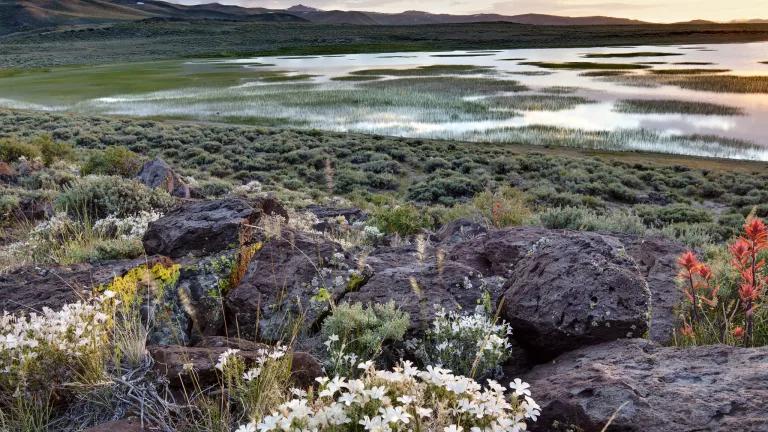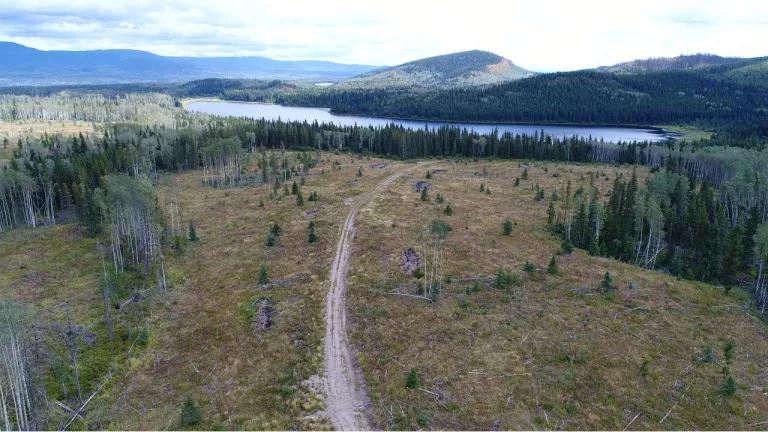
The Natural Resources Defense Council (NRDC) is calling on the U.S. marketplace to urge the logging company Resolute Forest Products (Resolute) to drop its litigation against public interest organizations and instead focus on demonstrating its commitment to sustainable forestry and conservation. NRDC has been engaged for over two decades in efforts to conserve Canada’s forests and assist its indigenous peoples in increasing control over their traditional lands. Canada’s boreal forest is one of the world’s last great forests, an ecological resource that plays a significant role in helping to regulate the global climate by holding at bay massive amounts of greenhouse gases in its trees and soils, provides habitat to thousands of plant and animal species, serves as a global freshwater storehouse, and is home to more than six hundred First Nations communities. It is an area containing some of the largest unbroken ecosystems on earth large enough to support complex, intact and native ecosystems. Unfortunately, across Canada’s boreal, these intact forests landscapes are steadily degrading, the habitat of the threatened woodland caribou is declining precipitously, and the last refuges for much of the boreal forest’s biodiversity are in danger of being lost. The long-term health of Canada’s boreal forest is at risk and requires urgent attention from government and industry. Because the U.S. is the destination of much of the lumber, pulp and tissue sourced from Canada’s boreal forest, customers of Canada’s boreal products have an opportunity and responsibility to weigh in.
As the largest logging company in Canada and the manager of such a vast area, Resolute’s actions and activities have a direct impact on the ecological vitality of Canada’s magnificent boreal forest.[1] As described below, the company’s commitment to sustainable forestry and conservation in the Canadian boreal has been called into question. But Resolute has responded to public criticisms of its forestry practices by suing its critics.
Suing Critics
In the most egregious example, Resolute lodged a lawsuit based on the Racketeer Influenced and Corrupt Organizations Act (RICO)—a U.S. law developed to combat the mafia—to sue Greenpeace and Stand.earth, public interest organizations that continue to be critical of Resolute’s practices in the boreal forest.Public interest organizations advocating for environmental protection and media organizations are deeply concerned about Resolute’s actions. As the Reporters Committee for Freedom of the Press and eleven media companies stated, Resolute’s claims “share a central purpose—silencing speech on matters of public concern.”
The RICO suit is just one in a series of lawsuits the company has served on its critics. In 2013, Resolute brought a defamation case against Greenpeace for statements critical of the company’s operations and practices in the boreal forest. While this litigation is ongoing, the Ontario Superior Court recently ruled that a number of the assertions by Resolute in that case should be struck as improper and irrelevant, and indeed referred to one of the assertions as “scandalous and vexatious.” We expect US courts to similarly condemn the manner in which Resolute has framed its critics’ conduct in the RICO suit. In 2014, after the Rainforest Alliance—a leading sustainable forestry certifier—produced audits citing Resolute for non-compliance with FSC standards in two of its tenures, the company sued Rainforest Alliance with the stated purpose of suppressing those reports. The Rainforest Alliance litigation was ultimately settled, but Resolute’s complaint is notable for having named individual staff members as defendants. NRDC strongly condemns this lawsuit as it bypassed by normal dispute resolution process already set up by the Forest Stewardship Council.
Declining Commitment to Sustainable Forestry
Meanwhile, in recent years Resolute has moved away from internationally accepted sustainable forestry practices. Resolute has not only significantly decreased its commitment to Forest Stewardship Council (FSC), the world’s only independent sustainable forestry certification system, but also has actively criticized the system itself. As recently as 2010, Resolute pledged to have 80% of its lands certified by the FSC. And yet, since 2012, the acreage of land managed by Resolute pursuant to FSC certification guidelines has fallen by nearly 50%. Some of the reductions in this certification is due to the company having its lands suspended by the independent Forest Stewardship Council. By 2015, Resolute announced that it would not seek new certifications from FSC and do not appear to be renewing existing certifications.
Resolute’s actions in Canada have also led to its loss of recognition from the conservation community. In December 2015, the World Wildlife Fund ended its recognition of Resolute due to its failure to reach its stated commitment to increase FSC certification. In May 2013, seven of Canada’s top environmental organizations working on boreal protection announced they would “suspend further work with Resolute under the collaborative Canadian Boreal Forest Agreement” citing a lack of faith in the company’s commitment to science-based conservation.
These suits against Resolute’s critics and the company’s attacks on the FSC system detract from the real issues facing the boreal forest and undermine efforts to develop solutions for them.
- Canada’s Intact Forest Landscapes are being lost. Global Forest Watch Canada recently reported an alarming erosion of Canada’s large intact forests, with cumulative losses of intact forests in totaling the area of Great Britain between 2000 and 2013. Intact forest landscapes (or IFLs) are unbroken ecosystems large enough to support complex, intact and native ecosystems while also holding large stores of carbon in place. While logging IFLs often does not meet the technical definition of “deforestation”—or conversion of land to another use—it does degrade the role of these ancient forests as critical ecosystems that provide habitat for hundreds of species and stores of carbon. In an effort to help spur the preservation of remaining IFLs in Canada’s commercially accessible forests, the FSC has begun work to encourage the preservation of IFLs—but its efforts are under attack by Resolute.
- Woodland Caribou—a critical indicator species for healthy boreal forest landscapes—is under threat. Few species have been more impacted by human caused activities in the boreal than the threatened woodland caribou. Woodland caribou are both dependent upon—and a necessary part of—the boreal forest, fulfilling many essential ecosystem functions. Because woodland caribou are particularly sensitive to habitat disturbance, they also act as an indicator species, reflecting the health of their boreal home. This makes the declining numbers of woodland caribou all the more troubling. Only fourteen of the fifty-one local boreal caribou populations are considered self-sustaining. The boreal populations of woodland caribou are now listed as “threatened” including populations in Ontario, Labrador, the Northwest Territories, and Quebec, but the habitat loss driving their population decline continues. At least 65 percent of caribou habitat must be left undisturbed in order for the caribou to be self-sustaining, but currently provinces are not meeting this essential management requirement, and populations continue to decline.
- Human activities are undermining the boreal’s role fighting climate change. With its old-growth forest and carbon-dense peatlands, the boreal provides the world’s highest density of carbon stores. The boreal’s soil and plants hold approximately 208 billion tons of carbon, which is prevented from being released into the atmosphere as long as these resources remain undisturbed.[2] This vast network of ecosystems provides both regional and global benefits, all of which depends on a landscape that is protected from unsustainable human impact and industrial development. However, clear-cutting changes these forests from a carbon dioxide sink and reservoir to a source of carbon dioxide emissions, hamstringing efforts to combat climate change.
It is time that the United States market place—the destination of much of the lumber, pulp and tissue sourced from Canada’s boreal forest—step up its demand that the products it sources come from sustainably managed forests and urge provinces to enact policies that will protect the boreal forest’s threatened species and intact forest landscapes. The market place has been a powerful voice for protection of Canada’s forests in the past and other large logging companies and their customers already support efforts to protect the boreal. But much more needs to be done and quickly. The place to start is for Resolute to drop its litigation against public interest organizations, cease its attacks on the FSC system, and ensure free, prior and informed consent from First Nations on their territories. The bigger goal of conserving the Boreal forest and committing to sustainable forestry must become the priority.
[1] The Montreal based logging company Resolute manages more than fifty million acres of land in Quebec and Ontario, most of which is public land in the boreal forest.
[2] Canadian Parks and Wilderness Society, Environmental groups suspend further work with Resolute under Canadian Boreal Forest Agreement, May 21, 2013, http://cpaws.org/news/environmental-groups-suspend-further-work-with-resolute-under-cbfa.




